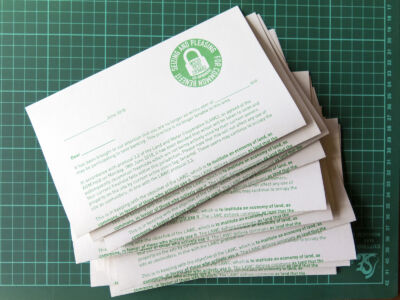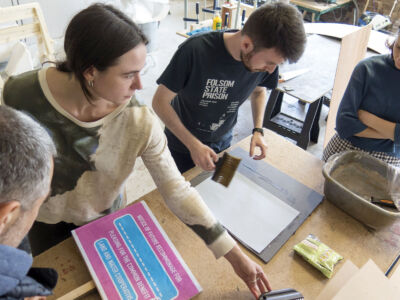The Co-op Protocol
With the Land and Water Co-operative (LAWC, Glasgow), STEALTH have been working on instituting an economy of land, as commons, in the Glasgow Canal Area. This area – a remarkable mix of derelict and re-used industrial facilities, vacant lots, the workshops of the Scottish Opera and a large stretch of green along the Canal – is under increasing pressure from real-estate speculation.

Department of Cleansing site, photo: Jassy Earl
A substantial part of the site is currently subjected to practices of land-banking, whereby absent landlords retain control of derelict or underused land with the aim of making considerable financial gains in a future market. This has become an alarming reality, as it increasingly prevents local communities from benefitting from the (affordable and accessible) land asset in the area.
Recently, the LAWC has made the landmark decision to take action countering practices of land-banking and has called on a number of people with experience in setting up institutions of collective action to guide the LAWC through the critical period of laying out the groundwork as well as implementing the practical aspects of this.
Chairholders (the group of people entitled to reclaim derelict spaces, including those spaces subjected to real-estate speculation and land-banking) convene on the Grassy Assets (land) to seize land for future Useholders (the part of collective entitled to use common urban space proactively). Photos: Jassy Earl
Upon arrival at the scene, with the workgroup we started a visual check-up of the entire perimeter of the area (within 300 meters of the Glasgow Canal between Pinkston and Firhill) to get an understanding of the challenges at hand. To actively start engaging in the land-politics of the area, not only impacts LAWC’s modus of collaboration and collective governance in the area, but necessarily includes the rather bold move of transferring land ownership into collective hands. At the Annual General Meeting held on Monday, 18th June 2018, it has been decided that action will be taken to seize and subsequently recommon freeholds which are not being actively used by their current owners.
Preparations taking place for upcoming Seizures.
With the workgroup, we have proceeded to detail the setup of such an approach, broadly along the model of a Community Land Trust. This has resulted in a Protocol for the Commons, outlining the powers and responsibilities of the Land and Water Co-operative and which has subsequently adopted by the co-operative.
“We need protocols to introduce the kind of occupancies and experiences that we have been imagining and testing, and slowly infiltrate them into the language and policies of local authority. Because institutions cannot prevent what they are not able to imagine.” (dpr-barcelona, Glasgow, June 2018)
To make sure for the adopted policy to come into immediate effect, during the remainder of our period in Glasgow with the members of the LAWC, measures have been taken to counteract land-banking taking place at Phoenix Nursery and the neighbouring (former site of the municipal) Department of Cleansing, where Notices of Seizure for Recommonage have been installed. The activities have been documented to further facilitate public mediation of the objectives and protocols of the co-operative.
Note: The Land and Water Cooperative is today still a fictitious entity. However, in early 2018, the Glasgow Canal Coop has been established. In an encouraging unfolding of a possible future, the LAWC’s objectives may get boldly embraced and implemented by the current co-op. The necessary protocols are now available.
- [download ] Protocol for the Commons, Letter to absent landlords and the Notice of Seizure (pdfs)
- [team ] STEALTH.unlimited (Ana Džokić and Marc Neelen) with Abigale Neate Wilson and Issy Arnold, Gaelen Britton, Rachael Clerke, Andrew Corletto, Louisa McGuigan, Julie Murray
- [photography ] Jassy Earl
- [woodwork expertise ] Simon Worthington
- [printwork ] RISOTTO and Flux Laser Studio, Glasgow
- [background ] The Co-op Protocol is a workshop led by STEALTH.unlimited as part of Test Unit 2018, an intensive week of turning talk into action at Speirs Locks, an area linked to the Canal in north Glasgow. Test Unit is initiated by Agile City.
- [timeline ] 17 – 23 June 2018












You must be logged in to post a comment.